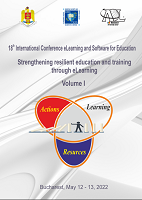MAPPING CREATIVITY ATTITUDES IN STEM EDUCATION-CASE STUDY
MAPPING CREATIVITY ATTITUDES IN STEM EDUCATION-CASE STUDY
Author(s): Cristina TriponSubject(s): Education, Sociology of Education, Pedagogy
Published by: Carol I National Defence University Publishing House
Keywords: STEM education; 21st century skills; creativity; teacher strategies;
Summary/Abstract: The initiated article aims to analyze the creative attitudes of students, in relation to the professional field for which they are preparing in the university. The results showed that there are significant differences regarding the reference areas of the creative attitudes component, as well as the need to integrate certain didactic techniques and strategies, in the university teaching activity, in order to develop the students' level of these creative attitudes. The interpretation of the answers offers the possibility of evaluating the following creative attitudes: energy, concentration, orientation towards the new, argumentation of ideas, independence, nonconformism, self-confidence, moral values, orientation towards a distant future, completion, risk, preference/attraction to difficult problems, diversity of interests, spiritual values, practical values and scale of lies. These are all the more important because creativity is one of the 15 most sought-after skills in the workforce market, especially that of STEM professionals. The teacher's attitude is of crucial importance in stimulating and maintaining the creative climate. The choice of a creativity-focused education cannot be other than the "stimulating teacher" model, as opposed to the "inhibitory teacher" model. The stimulating teacher conducts the instructional process informally, encourages at all times the free expression of students' opinions (even those contrary to their own opinions), stimulates independent work, is always available for individual discussions with students, is concerned, and knows how to ensure security and the psychological freedom of students.
Journal: Conference proceedings of »eLearning and Software for Education« (eLSE)
- Issue Year: 18/2022
- Issue No: 01
- Page Range: 317-323
- Page Count: 7
- Language: English

